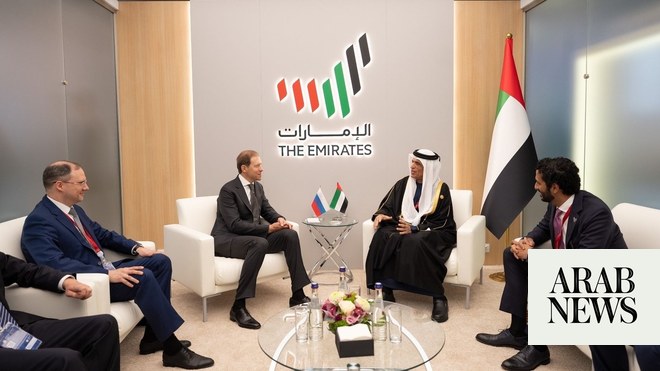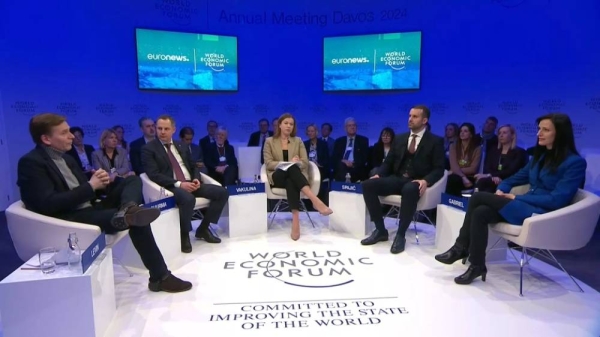
On Friday, President Vladimir Putin assembled the most impressive panel ever seen at the St. Petersburg Economic Forum, which he’s used as a showcase for Russia and himself since 2006. He had a non-attendee to thank for the full house, Donald Trump.
Usually, one or two foreign leaders attend the forum to act as foils for Putin, who delivers a keynote address, pitching Russia as an investment destination. This year, however, Putin shared the stage with President Emmanuel Macron of France, Prime Minister Shinzo Abe of Japan, International Monetary Fund Managing Director Christine Lagarde and the Chinese vice president, Wang Qishan. They all had something in common: They’ve been slighted, rebuffed or otherwise aggravated by Trump.
Macron visited the US president last month to try to dissuade him from imposing high import tariffs on European steel and aluminum, but also to plead with him not to pull the US out of the 2015 Iran nuclear deal. He failed on both counts.
Abe was one of Trump’s early victims, when the US abandoned the Trans-Pacific Trade Partnership, which would have benefited Japan.
As for Wang, Trump keeps threatening to start a trade war with China, though he’s blown hot and cold on that. In addition, China is the biggest international patron of North Korea.
Lagarde represents the international organizations that form the institutional backbone of globalization. Trump has shown a contemptuous disregard for the system’s rules and recommendations.
Putin is seething with anger about US economic sanctions against Russia and what he has long seen as America’s unilateralism on just about every issue and around the globe.
So this year’s St. Petersburg Economic Forum could have turned into a support group for people traumatized by Trump. But in their prepared speeches, the dignitaries avoided mentioning the US president’s name. The leaders only lifted the taboo under some pointed questioning from the moderator, Bloomberg Editor John Micklethwait.
One reason for this reluctance to attack Trump directly is that, 16 months into his presidency, the support group members have no idea what to do about him. It’s also extremely difficult for them to form a common agenda.
In his opening speech, Putin made an impassioned appeal for the preservation of a rules-based international system and against “economic egotism” and unilateralism (a reference, of course, to He Who Shall Not Be Named). But at least to some Europeans such as Macron and Lagarde, Putin’s plea must have been rich with irony, coming from the leader of a country that has invaded a neighboring state and who on Friday was accused by the Netherlands and Australia of downing a passenger airliner in July 2014.
During the Q&A, Putin teased Macron about Europe’s dependence on the US for security. “Don’t worry, we’ll provide security,” he said. Macron would have none of it; he said he was happy with the current structure.
Abe spoke of a huge potential for energy cooperation with Russia and of Japanese investment for the Russian Far East. But no such partnership would be possible without first resolving a dispute over the Kuril Islands that has prevented the two countries from signing a post-World War II peace treaty. Putin and Abe have failed to advance on the issue in the 20 meetings they have held so far. Still, Abe started his speech with a fantastical scenario for the upcoming soccer World Cup that involved Russia and Japan facing off in the finals. That’s about as realistic as a deal on the islands and the rest of the grand cooperation plans.
The Chinese vice president, who tried to say as little as possible, stuck to his country’s strategy of conducting an unemotional dialogue with everyone, making no enemies and getting the best possible deals. As far as China is concerned, Europe, the US, Russia, Japan and the international institutions are all arm’s-length partners.
There would be grounds for a broad anti-Trump coalition, but it will never coalesce around Putin, the most passionately anti-American of the group. He would be even more unreliable than Trump. Inexperienced Macron can’t be a convincing leader, either; Japan is too focused on regional interests; China is impervious to anyone’s pull; and the international institutions mean little without the US and have to stay neutral.
That they all came together in Russia would be an alarm signal to any US leader except Trump. But he’s too focused on domestic politics and his promises to his base. The St. Petersburg gathering isn’t a threat even to Trump advisers who would like the US to display its might. The meeting is so ragtag and disunited, it doesn’t give the appearance of the beginning of a beautiful friendship. Not yet, at least. Trump still has enough time in office for that to start changing. Obstacles to “mutual trust,” the leitmotif of the leaders’ speeches in St. Petersburg, could fade if the US remains as unpredictably intractable as it has been in the past 16 months.
Bloomberg View












